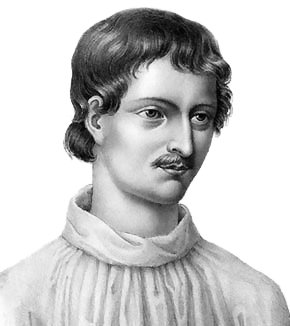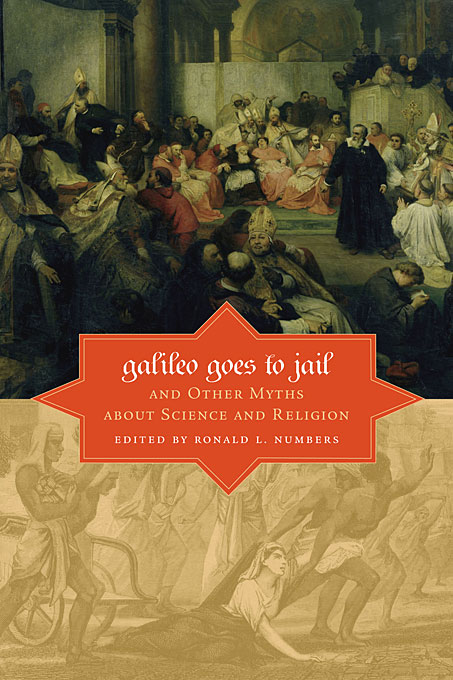It is odd that a great scientific series on the cosmos should open with an attempt to single out one victim of the Inquisition and hold him up as a martyr to science. For inexplicable reasons, Cosmos: A Spacetime  Odyssey begins not with Copernicus confidently proposing his heliocentric hypothesis or Galileo excitedly proclaiming his telescopic discoveries. Rather, it begins with the story of Giordano Bruno (1548-1600), a renegade Dominican friar executed in 1600 for persistently preaching heretical theological views about a wide variety of core Christian doctrines.
Odyssey begins not with Copernicus confidently proposing his heliocentric hypothesis or Galileo excitedly proclaiming his telescopic discoveries. Rather, it begins with the story of Giordano Bruno (1548-1600), a renegade Dominican friar executed in 1600 for persistently preaching heretical theological views about a wide variety of core Christian doctrines.
Of course, in 2014 we don't burn people at the stake, and except for the most conservative voices, Christians don't cast about casually labelling any dissenting theologial perspective as "heresy."
But Cosmos makes Bruno out to be a martyr who died heroically in the defense of early modern science, and this is a role he certainly did not play. Jole Shackleford details this nicely in his exploration of the myth that "Giordano Bruno was the First Martyr of Modern Science" in Ron Numbers' edited volume Galileo Goes to Jail and other Myths about Science and Religion (2009).
The idea of a reboot of the classic Cosmos series (1980) is exciting. The original series inspired in many people a deep and abiding love for science, and the revival has tremendous potential to expose a new generation to the wonder and value of science. I began watching Cosmos: A Spacetime Odyssey with great interest, in the hope of discovering some new perspectives on the fabulous story of our unfolding universe. Some new ideas are there indeed, and I will eagerly tune in to future episodes to see what else emerges. But I also saw—among the compelling video of the solar system and galaxies—considerable slipshod history of science and a curiously antireligious bias.
Thirty years ago Carl Sagan restated—no doubt with tongue in cheek—an ancient paean of praise from the Christian liturgy: “The cosmos is all that is or ever was or ever will be.” His echo of the Christian doxology—“As it was in the beginning, is now and ever shall be, world without end”—carried an implicit nontheistic metaphysical claim in setting the stage for his telling of the cosmic story. Neil deGrasse Tyson uses that same phrase for his own retelling of Cosmos.
To be fair, it is probably an impossible task for anyone completely to separate his understanding of the universe from his personal beliefs about the existence or nonexistence of meaning, purpose, and value in that universe. Consciously or unconsciously, all of us—Christian or Muslim, monotheist or atheist, freethinker or agnostic—carry the baggage of metaphysical beliefs in our approaches to science. If we are honest, we will explicitly acknowledge our metaphysical carry-on, recognizing that the story of this pulsing, vibrating, magnificently unfolding universe is susceptible of both theistic and atheistic interpretations.
Unfortunately, the series premiere risks squandering that opportunity through a combination of misleading history and reliance on an antiquated narrative of inevitable conflict between science and religion—and the Catholic Church in particular—that simply is not borne out by the facts. A generation of careful scholarship has given us a nuanced and sophisticated understanding of the long, rich, and complex relationship between religion and the sciences. This latest Cosmos reflects none of that historiography, presenting us instead with what is quite literally a cartoon version of the life story of someone who was not a scientist. Missing were the stories of Catholic astronomers such as Copernicus and Galileo, Protestants such as Brahe and Kepler and Newton, or Fr. George Lemaître, proposer of the Big Bang.
It is odd therefore that Cosmos focuses almost exclusively on the marginal case of Giordano Bruno. Of course, I am not defending Bruno's persecution and death—no decent human being now would ever condone burning a person alive for any reason. Moreover, in 2014 we view legitimate theological dissent very diffferently than did our ancestors.
But the circumstances were quite different 400 years ago. According to the 16th century Italian legal code and the customs of Renaissance politics, Bruno was judged by an ecclesiastical court to be an obdurate heretic for r efusing to cease in promulgating his theological ideas. As such he was subject to capital punishment and was turned over for execution by the civil arm in Rome. [*Editor note: The preceding sentence originally said Bruno was "deserving of" capital punishment. Clearly a misstatement on our part!] In the 21st century we inhabit a very different era, a religiously pluralistic age of largely secular states in which the nature and exercise of authority are vastly different than they were in Post-Reformation Italy.
efusing to cease in promulgating his theological ideas. As such he was subject to capital punishment and was turned over for execution by the civil arm in Rome. [*Editor note: The preceding sentence originally said Bruno was "deserving of" capital punishment. Clearly a misstatement on our part!] In the 21st century we inhabit a very different era, a religiously pluralistic age of largely secular states in which the nature and exercise of authority are vastly different than they were in Post-Reformation Italy.
The relevant question about this unfortunate affair—in the context of Cosmos: A Spacetime Odyssey—is whether Bruno was executed for his scientific or for his theological views.Championing the plurality of worlds (contrary to the teaching of Aristotle) was a comparatively less significant doctrinal fault than some others. The most serious charges lodged against Bruno included:
- Speaking against the Catholic church and its ministers
- Holding opinions contrary to the Catholic faith about God and the divinity of Christ
- Holding opinions contrary to the Catholic faith about nature of Christ in the Eucharist
- Believing in reincarnation and the transmigration of souls into brutes
- Dealing in magic and divination
Based on these charges Bruno clearly was not a martyr for modern science, even if he did entertain some ideas about cosmology that would later bubble up in mainstream science. Nor, as the episode acknowledges in passing, did Bruno arrive at his belief in an infinite universe populated by many worlds through any scientific process, or test it through experiments or observation. Rather, these ideas came to him as a private revelation, and he presented them in that way, not as scientific conclusions based upon compelling evidence.
Bruno was an adventuresome thinker who threw caution to the wind at a time and in a place—in post-Reformation Italy—when that was a very dangerous thing to do. It would be anachronistic of us to judge the circumstances surrounding his trial and tragic execution on the standards of freedom of speech that we presuppose as a basic human right in 2014. And it would be anachronistic to judge his claims to have been scientific simply because future generations of scientists arrived at a similar conclusion. Science, as Tyson emphasizes throughout the first episode of Cosmos, is a process for testing ideas, which Bruno simply did not do for these claims.
It is troubling that Cosmos—as its only historical background—chose to portray a fallaciously interpreted version of the tragic story of Giordano Bruno. It is unfortunate that the writers uncritically repeated a false narrative about the history of science and religion, providing a public who are already confused about the relationship between these two endeavors with misinformation rather than an accurate and balanced account of a complex history of interaction. The Catholic Church was not monolithic in its approach to science throughout the early modern period. There were both reactionary and profoundly progressive elements within the church, and some of Galileo’s most important supporters were themselves clerics. If Neil deGrasse Tyson wants to recount some history of science in Cosmos, his writers have a professional obligation to furnish him with a text that honestly tells the story with all the subtlety it deserves. I hope to find such nuance in the remaining episodes of Cosmos: A Spacetime Odyssey.
